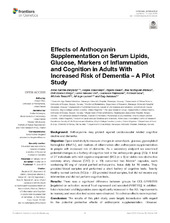| dc.contributor.author | Bergland, Anne Katrine | en_US |
| dc.contributor.author | Sønnesyn, Hogne | en_US |
| dc.contributor.author | Dalen, Ingvild | en_US |
| dc.contributor.author | Rodriguez-Mateos, Ana | en_US |
| dc.contributor.author | Berge, Rolf Kristian | en_US |
| dc.contributor.author | Melvær, Giil Lasse | en_US |
| dc.contributor.author | Rajendran, Lawrence | en_US |
| dc.contributor.author | Siow, Richard | en_US |
| dc.contributor.author | Tassotti, Michele | en_US |
| dc.contributor.author | Larsen, Alf Inge | en_US |
| dc.contributor.author | Aarsland, Dag | en_US |
| dc.date.accessioned | 2020-08-03T11:54:57Z | |
| dc.date.available | 2020-08-03T11:54:57Z | |
| dc.date.issued | 2019-06-11 | |
| dc.Published | Bergland AK, Sønnesyn H, Dalen I, Rodriguez-Mateos, Berge RK, Melvær LM, Rajendran L, Siow, Tassotti, Larsen AI, Aarsland D. Effects of anthocyanin supplementation on serum lipids, glucose, markers of inflammation and cognition in adults with increased risk of dementia - A pilot study. Frontiers in Genetics. 2019;10:536 | eng |
| dc.identifier.issn | 1664-8021 | |
| dc.identifier.uri | https://hdl.handle.net/1956/23361 | |
| dc.description.abstract | Background: Anthocyanins may protect against cardiovascular related cognitive decline and dementia. Objective: Open-label study to measure changes in serum lipids, glucose, glycosylated hemoglobin (HbA1c), and markers of inflammation after anthocyanin supplementation in people with increased risk of dementia. As a secondary endpoint we examined potential changes in a battery of cognitive test in the anthocyanin group (AG). A total of 27 individuals with mild cognitive impairment (MCI) (n = 8) or stable non-obstructive coronary artery disease (CAD) (n = 19) consumed two Medox® capsules, each containing 80 mg of natural purified anthocyanins, twice daily for 16 weeks. They provided blood samples and performed a short battery of cognitive tests. Twenty healthy normal controls (NC) (n = 20) provided blood samples, but did not receive any intervention and did not perform cognitive tests. Results: There was a significant difference between groups for CCL-5/RANTES [regulated on activation, normal T-cell expressed and secreted (RANTES)]. In addition, total cholesterol and triglycerides were significantly increased in the AG. Improvements in memory and executive test scores were observed. No adverse effects were reported. Conclusion: The results of this pilot study were largely inconclusive with regard to the potential protective effects of anthocyanin supplementation. However, anthocyanins were well tolerated, and compliance was high. Larger, placebo-controlled studies to explore the potential effects of anthocyanins on dementia risk are encouraged. | en_US |
| dc.language.iso | eng | eng |
| dc.publisher | Frontiers | eng |
| dc.rights | Attribution CC BY | eng |
| dc.rights.uri | http://creativecommons.org/licenses/by/4.0/ | eng |
| dc.title | Effects of anthocyanin supplementation on serum lipids, glucose, markers of inflammation and cognition in adults with increased risk of dementia - A pilot study | en_US |
| dc.type | Peer reviewed | |
| dc.type | Journal article | |
| dc.date.updated | 2020-01-17T13:30:53Z | |
| dc.description.version | publishedVersion | en_US |
| dc.rights.holder | Copyright 2019 Bergland, Soennesyn, Dalen, Rodriguez-Mateos, Berge, Giil, Rajendran, Siow, Tassotti, Larsen and Aarsland | |
| dc.identifier.doi | https://doi.org/10.3389/fgene.2019.00536 | |
| dc.identifier.cristin | 1717418 | |
| dc.source.journal | Frontiers in Genetics | |

